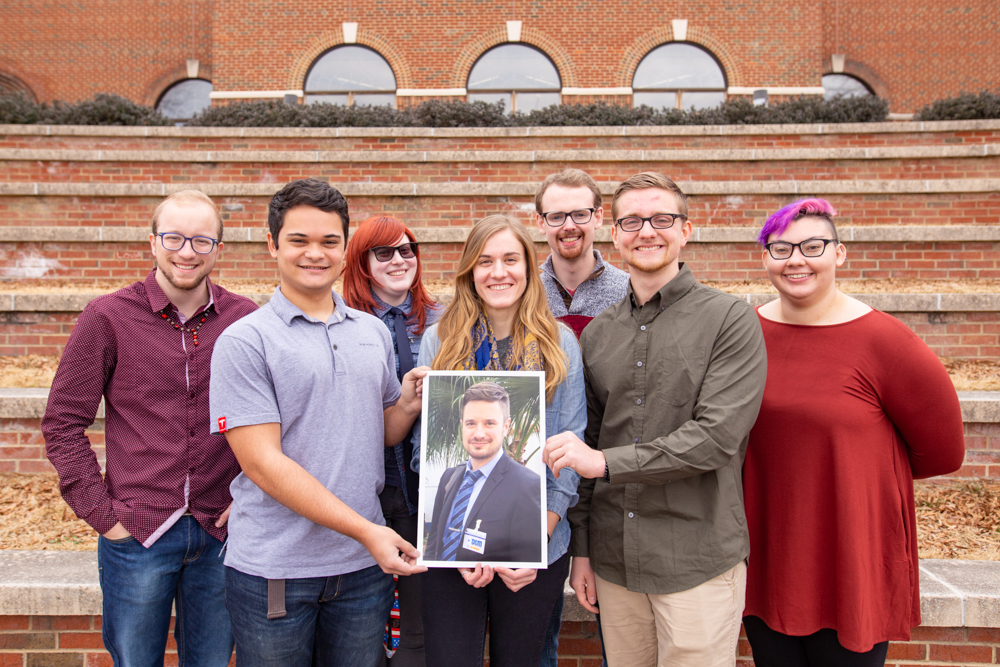A student-produced documentary about slain United Nations armed group expert and peacebuilder MJ Sharp ‘05 will premiere at Eastern Mennonite University in April. “No Longer Theory” focuses on Sharp and his coworker Zaida Catalán, who were murdered while working in the Democratic Republic of the Congo (DRC) in 2017.
The 50-minute documentary will have a pre-premier screening during the Academic and Creative Excellence Festival on Wednesday, April 17, at 4 p.m. in EMU’s Mainstage Theater.
The official premiere will be on Friday, May 3 at 7 p.m., also in MainStage Theater.
The five co-producers, all senior digital media majors, include Toni Doss, Christy Kauffman, Missy Muterspaugh, Kieran O’Leary and Riley Swartzendruber. Seniors Luke Mullet composed the music and Paul Johnson created animations and visual effects.
The title refers to MJ’s father’s observation that it should not be surprising when peacebuilders are killed in their work. The murder of MJ proved that this isn’t just a hypothetical danger; it’s a real possibility.

Sharp and Catalán have been the focus of ongoing media coverage – including this Swedish investigative documentary – and an awareness-raising rallying cry about the DRC. As one student co-producer said, “The story does not end with their deaths, but should inspire more peacebuilders to continue the journey.”
A big picture
The “journey” metaphor has become a literal part of how the EMU community is responding to Sharp’s legacy. In March, Kauffman and Swartzendruber were the MJ Dream Hike – to summit Kilimanjaro in Tanzania – which raised funds for the Michael J. Sharp Endowed Peace and Justice Scholarship. The fund provides support for a graduate student enrolled at EMU’s Center for Justice and Peacebuilding, with priority given to those from the DRC.
The trek has gained the support of former United Nations Ambassador Nikki Haley, and Nobel laureates Dr. Dennis Mukwege and Leymah Gbowee, as well as activist and actor Jane Fonda, among others.
“I have ceased to be surprised by the power of MJ’s story to move and inspire people,” said John Sharp, MJ’s father.
David M. Nyiringabo, the first beneficiary of the scholarship fund, said that although he never met Sharp, his life and passion are a challenge to the people of the DRC.
“As a Congolese, I should live a life that honors his life and his sacrifices,” Nyiringabo said. “He gave his life for us, and for people he didn’t know. If foreigners can take risks, what about us? What about me? I have relatives in Congo, and am hoping that one day my grandchildren will live in Congo. Why should I keep quiet?”
“We couldn’t just walk away”
“No Longer Theory“ began as a digital media production class project in the spring of 2018, but proved “bigger than a single semester class,” said Muterspaugh: “We couldn’t just walk away.”
It was finished through independent studies that, though they lasted into the spring 2019 semester, continued to hold a sense of urgency for the students.
“MJ and Zaida’s story should be shared with others to make them aware of everything that’s going on in the world,” said Doss. “I just wanted to provide an accurate insight into what their lives were like before – and their motive of genuinely wanting to help others.”
In their research, the students, all seniors, found a new layer of Catalán’s story “that no one else seemed to be telling,” Muterspaugh said. “My hope is that we successfully tell her story in parallel with MJ’s.”
“The documentary is a way to bring light onto the conflicts and issues present in the DRC and could help motivate people to want to do something to help,” said O’Leary. “It gives both MJ and Zaida’s lives a way to keep impacting the world and pushing forward the need to help other people, whether it be in the DRC or other places dealing with similar issues.”
The five co-producers were each involved in nearly every aspect of making the documentary over the course of its development, with two additional students assuming more focused roles.
“It has taken an immense amount of emotional energy to immerse myself in the story of this film,” said Mullet. “It has challenged me to live life in more radical service and care for others, and made me think deeply about how parents are affected by the death of their children.”
“Hopefully viewers will better understand the complexity in the world of peace-building,” said Johnson. “There are so many different kinds of people with all kinds of agendas. The mixing of these agendas on the global stage is an important part of MJ’s story.”
That story has always felt present for Kauffman, who was a student in a Hesston College class on peace and justice taught by MJ’s father when Sharp disappeared.
“Even though I never met MJ, I am definitely influenced by his life,” she said. “I hope that telling his story through the documentary will have the same effect on many others.”
The film is “a bridge for people to be aware of the issues in the Congo,” said Swartzendruber. “We hope that the audience will gain an understanding of the kind of people MJ and Zaida were, but also see that this is about much more than them.”
